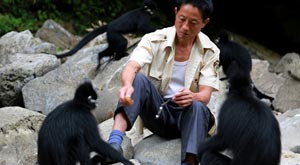Tamer takes care of rare-monkey business
China Daily, October 14, 2014 Adjust font size:
It is estimated that there are about 2,000 langurs in the world, mostly in southern China and northern Vietnam. There were 730 langurs, formed into 76 groups, in the Mayanghe nature reserve in 2004, according to the environmental group Fauna and Flora International.
The local government initially appointed four workers to feed the langurs, but now only Xiao remains as the sole langur tamer in China.
He started the feeding routine with a group of five langurs dwelling in a cave. For two months he camped at the cave entrance, about 30 meters from the langurs' dwelling, observing their behavior and recording the physical characteristics and food habits of each member of the group.
Xiao put corn, peanuts, and sweet potato chips at the same spot each day at the exact same time.
He formally "introduced" himself to them on Chinese New Year's Day 1998, when he stayed near the food in full sight.
"I was surprised and comforted that they didn't run away when they saw me," he said.
Xiao then spent another month summoning the langurs by whistles.
During the past two decades, Xiao has grown into an expert on their rituals and behavior.
Based on his observations, the number of langurs in the reserve is about 800 as their reproductive cycle is slow and the groups follow a hierarchal system. Only the leader of each group has the right to mate and breed, and intermarriage is forbidden.
Besides, the langurs, whose average lifespan is about 26 years (roughly the amount of time Xiao has been in contact with them), can only give birth to one offspring at a time, and the interval between births is about three years.
Animal behaviorist Hu Gang, whose specialty is langurs, said Xiao's work provided him with a valuable insight when he came to the reserve in 2003.
Hu classified the langurs into four age groups: The infants-less than 6 months old; "teenagers"-around 2 years old; "youths"-from 4 to 5 years old; and the "adults"-more than 6 years old.
"The langurs attach great importance to family values," Xiao said, but they have a violent streak and whenever a leader is overthrown, as frequently happens, their offspring are often killed to ensure supremacy.
One group leader was overthrown by a younger rival with whom Xiao had established a good relationship. In time, that leader was overthrown and Xiao knows his newborns were killed.
Xiao's devotion to the reserve has not brought him financial rewards.
"We have just scraped by for the past two decades," Xiao's wife said.
But for Xiao, it has been rewarding because he is not taming the langurs for himself but for the world.


